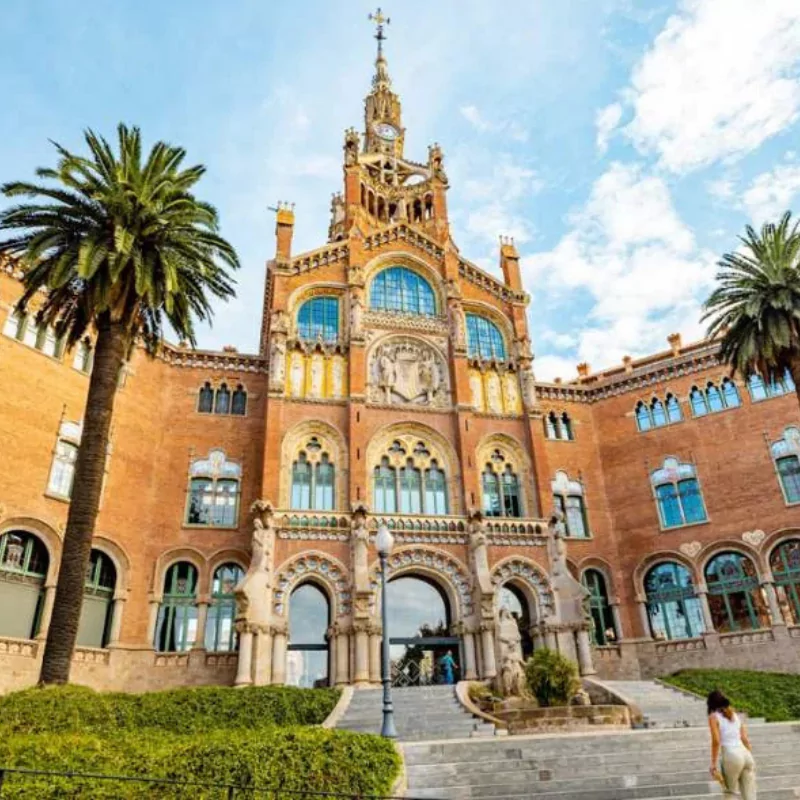
Announcements

Announcements
Spain has a vibrant and welcoming culture, which makes it an ideal destination for students looking to study abroad. Not only the culture, but Spain is the home to prestigious & well-renowned universities & colleges, offering world-class education & diverse learning experiences. Studying in Spain can allow you to interact with thousands of students from around the world with diverse backgrounds & experiences. Hence, offering you opportunities to make new friends, experience festivals, and enjoy the culture while living & studying in Spain.
These experiences while living in Spain can allow you to enjoy both academic & personal growth. Along with these, if you opt to Study in Spain it will also provide you the opportunity to sharpen your Spanish language skills in a relaxed and multicultural environment.
Furthermore, Spain's vibrant socio-cultural scenario, including coastal areas, traditional food, and diverse festivals, makes it a preferred study destination. So, if you want to study in Spain, then you must go through the details listed below to get a better snapshot.
Before going further, let’s check the important highlights to study in Spain for Indian students.
| Total Universities | 76 (Public – 45, Private – 31) |
| Top Cities for Students | Madrid, Seville, Barcelona, Valencia |
| Total International Students | 208,366 (Regular Courses – 153,089, Mobility Courses – 55, 277) |
| Study Cycles | Bachelor's, Master's, Doctorate |
| Medium of Instruction | Spanish, Catalan, Basque |
| post study work permit in Spain | 20 Hours per week |
| Living Cost for Students | Euro 10,800-13,200 per year |
Several reasons exist that make Study in Spain a preferred option for every international student looking to fulfill their study abroad goals.
Before you apply to Study in Spain For Indian Students, you must be aware of the potential cost of living and studying there. It will involve checking on the tuition fees, transportation, rent, & other key expenses. So let’s have a brief overview of the cost involved so that you can plan your budget accordingly.
Below, you can check the tuition fees to study in Spain for Indian students.
| Study Level (Public University) Semester fees | ||
|---|---|---|
| Level | Fees (in Euro) | Fees (in INR) |
| Bachelor’s | 750-2,500 Euro (Approx.) | Rs 67,983-Rs 2,26,610 |
| Master’s | 1,000-3,500 Euro | Rs 90,644-Rs 3,17,254 |
| Private Universities | ||
| Type | Fee (in Euro) | Fee (INR) |
| Private Universities | 20,000 Euro | Rs 18,12,880 yearly |
| Business Institutes | 25,000 Euro | Rs 22,66,100 yearly |
| MBA | 30,000 Euro | Rs 27,19,320 yearly |
| By Enrollment | ||
| Enrollment | Fee (in Euro) | Fee (INR) |
| 1st Enrollment | 12 Euro | Rs 1088 per credit |
| 2nd Enrollment | 25 Euro | Rs 2266 per credit |
| 3rd Enrollment | 50 Euro | Rs 4532 per credit |
Here is the breakdown of the cost of living in Spain. However, these costs are just estimates & may vary depending on the locality & your living standards.
| Expense | Average Monthly Cost (€) |
|---|---|
| Rent (One-bedroom apartment) | €400 - €900 |
| Groceries | €200 - €300 |
| Public Transportation (Monthly Pass) | €35 - €60 |
| Dining Out (Inexpensive Restaurant, per meal) | €10 - €15 |
| Dining Out (Mid-range Restaurant, three-course meal for two) | €40 - €50 |
| Utilities (Electricity, water, heating, internet) | €100 - €150 |
Find the right path with Meridean
Below is a table that shows some of the top universities in Spain for international students, along with their rankings in the QS World University Rankings 2025, their location, and the percentage of international students.

#164
QS World Ranking

#165
QS World Ranking

#175
QS World Ranking

#198
QS World Ranking

#265
QS World Ranking

#285
QS World Ranking

#321
QS World Ranking

#371
QS World Ranking

#431
QS World Ranking
From the table below, you will find the admission requirements to study in Spain.
| Where to apply | University Portal/ University Portals |
|---|---|
| Application Fee | €30 and €50 for public universities Up to €200 for private universities |
| Basic Requirements | Transcripts, Passport, Standardized tests for studying in the Netherlands |
| Additional Requirements | Updated CV, Statement of Purpose |
| English Language test |
IELTS: Overall 6.5 score with no band less than 6
TOEFL: 90-100
|
If you have decided to Study in Spain, then you must be aware of the key course & program deadlines so that you won’t end up missing your desired seat. Spanish Universities majorly offer two intakes for international students, these are fall intake & spring intake.
However, to overcome the risk of delays in form submission & application to a specific intake you must consult with reputed abroad study consultants at Meridean Overseas. Also, such an interaction can also allow you to process your application much more smoothly.

Here are the details of popular courses that international students can choose to study in Spain. These courses give you more opportunities worldwide.
| Stream | Courses |
|---|---|
| Business Administration |
|
| Hospitality and Tourism Management |
|
| Architecture |
|
| Art and Design |
|
| Language Studies |
|
| Engineering |
|
| Health Sciences |
|
| Environmental Science |
|
| Culinary Arts |
|
| International Relations |
|
Connect With Meridean & Get Your Abroad Education Dream Fulfilled
To study in Spain for Indian students, proficiency in English is often necessary, especially for programs taught in English. The following English proficiency tests are commonly accepted by Spanish universities.

Having a valid student visa is essential if you have a dream to Study in Spain. However, there are different types of visas available depending on the validity they have. To get a student visa, you must go through a step-by-step process & complete the required documentation so that you can get the visa approval seamlessly.
Let’s discuss in brief the visa types & key requirements to get a student Visa to study in Spain.
Depending on the visa you are applying for, several eligibility requirements exist that need to be fulfilled. Such include:
You can get a better understanding of the visa requirements and the documents by interacting with overseas education consultants.
Studying abroad requires you to plan your budget and funding sources to finance your education. Hence, to support your finances and ensure your study affordability in Spain, there are several scholarships, loans & grants available. However, some eligibility criteria need to be fulfilled to apply for scholarships.
The following scholarships & grant opportunities are available to study in Spain.

I applied visa for Australia through this website . Mr. Prashant &Mr. Prakash made the job hastle free for me. They were friendly, helpful & available all the time .My work is done in a smooth way & I highly recommend them. Moreover, you can book the free counselling session with them that give you the proper guidance to study abroad. I have no complaints and I am very grateful for the support 🙏

Meridean Overseas is best in Ahmedabad. Prashant Sir is very supportive and gives his best efforts for every applicant’s visa process. They have very good coordination with universities in Australia. I got Australia Dependant Visa today, so very happy for this and very thankful to Prashant Sir from Meridean Overseas, his work is best. I am extremely happy with the Meridean Overseas Education, Ahmedabad.

I would like to thank you very much for your time and support during my visa adjustment process and for helping me to obtain the desired outcome. I am also very thankful for your help in preparing me for the university interview which made the approval of my visa adjustment very successful. Best institute in India if you want to study abroad. I am personally thankful for SOMYAA KHANGAROT ma’am. She is very supportive and also motivates the students. Again thank you so much MERIDIAN Overseas and their team. ❤️💕

Vineeta, the stellar counselor at Meridean Overseas, made my study visa journey for New Zealand overseas education hassle-free. Actually i didn't put my file in merdian, but I put in another consultancy, they are not gave such support. Also, I am wroking person. One day I see Video in Instagram and contact to Meridian Overseas. about my visas queries and my visa slots. So they always help me in without any fees. On that day my consultancy didn't call me for the slot opening. But Merdian team call me for the slots and because of that I booked my slots.
So I Appreciate their work and Also, I recommend to my family member and friends.

First of all i would say full team of Meridean Overseas is very hard working generous and supporting people and my consultant Mr. Shubhang is very honest and very supportive person and while in the meeting. He told me each and everything clearly and nicely. I was really very impressed and got so many information during the meeting. And you all won't believe the meeting was absolutely free . You can also go and meet the team They are very friendly and clean as glass. If you are willing to go to abroad please consider them and give them a chance to consult you.

I had a wonderful experience with Meridean Overseas. My counselor's name is Miss Tanya Soni. She was incredibly helpful in every aspect, her guidance helped me a lot in understanding my process and solving my problems with the best possible solutions. I am very interested in studying in Poland, and Tanya ma'am helped me significantly, because of her guidance, my dream has come true. I'm very grateful for choosing a counselor from Meridean Overseas.

So far, my experience with Meridean Overseas has been truly remarkable. The experts at Meridean Overseas possess impressive knowledge and demonstrate a strong commitment to providing friendly service to their clients. My process consultant Miss Rashi, stands out with her profound understanding and consistent helpfulness. She is adaptive and ensures the completion of tasks in a timely manner. The team responds promptly to queries, and I am genuinely satisfied with the assistance received thus far. I have high expectations that the remainder of my visa application process will be handled with the same level of professionalism and efficiency.
Thank you, Meridean Team.

My experience with MOEC has been great. I would recommend MOEC for students who wants to pursue their further studies in abroad as their staff is extremely helpful and suggests the best. My counsellor has been really supportive throughout the entire process, from course selection to till visa approval. She always clarified my doubts and helped me in every single way possible and I highly appreciate it.
Ans. International students can typically apply directly to Spain universities through the institution's website or the centralised admissions portal. Each university may have its own specific requirements and application procedures, so it's essential to check with the respective institutions for detailed instructions
Ans. Yes, scholarships and financial aid programs are available for international students to study in Spain. These scholarships may be offered by the Spanish government, universities, or external organisations. Applicants can explore options such as the Spanish Government Scholarships, the Erasmus+ program, and scholarships provided by individual universities.
Ans. Language requirements to study in Spain may vary depending on the program. While many universities offer programs in Spanish, some also offer courses in English. International students may be required to demonstrate proficiency in the respective language through standardised tests such as the DELE (Spanish) or TOEFL/IELTS (English).
Ans. Yes, international students studying in Spain can work part time during the academic year and full time during scheduled breaks. However, it's essential to balance work commitments with academic responsibilities to ensure success in studies.
Ans. The cost of study in Spain for Indian students may vary depending on factors such as tuition fees, accommodation, living expenses, and personal preferences. On average, overseas students can expect to spend between €6,000 to €12,000 per year on tuition fees, with additional costs for accommodation, food, transportation, and other necessities.
Ans. To obtain a student visa for Spain, international students must first receive acceptance from a Spain university or educational institution. Once accepted, they can apply for a student visa through the Spanish consulate or embassy in their home country. Applicants must provide documents such as proof of enrollment, financial means, health insurance, and a valid passport.
Ans. Yes, overseas students who have completed their studies in Spain may be eligible to apply for permanent residency or work permits, depending on various factors such as their employment status, duration of stay, and compliance with visa requirements. It is suggested to consult with immigration authorities for specific eligibility criteria and application procedures.
Ans. Yes, studying in Spain offers ample opportunities for cultural exchange and immersion. International students can participate in language exchange programs, cultural events, festivals, and excursions to explore Spain's rich history, art, cuisine, and diverse traditions.
Ans. Spanish universities typically offer a range of services for international students, including orientation programs, academic advising, counselling services, language assistance, and cultural integration programs. Moreover, many universities have international student offices or dedicated staff members to assist with administrative matters and provide guidance throughout the student's academic journey.
Ans. Yes, international students can extend their student visas in Spain if they need additional time to complete their studies. However, extensions are subject to certain conditions and requirements, including maintaining full-time enrollment, satisfactory academic progress, and compliance with visa regulations. It's essential to consult with the Spanish immigration authorities or the university's international office for guidance on visa extension procedures.
Contact MOEC Experts for Study Abroad Guidance!
